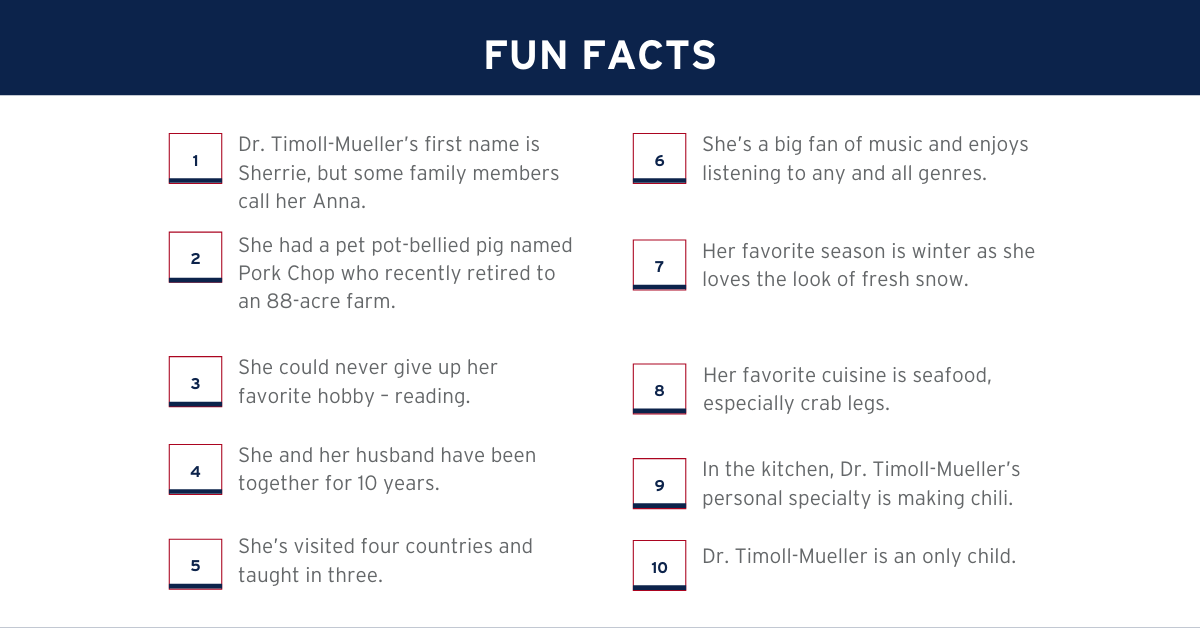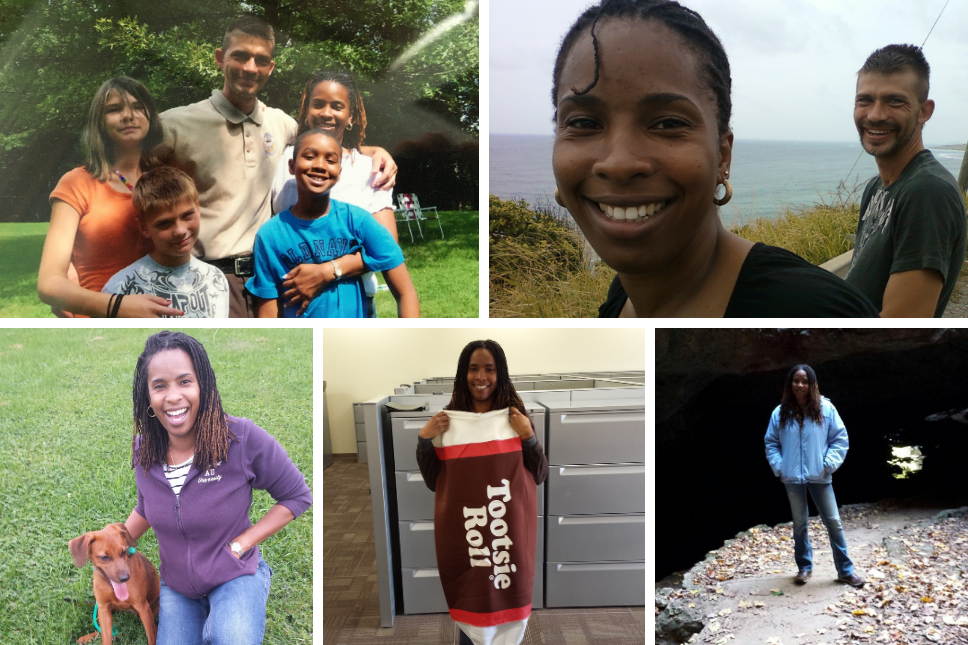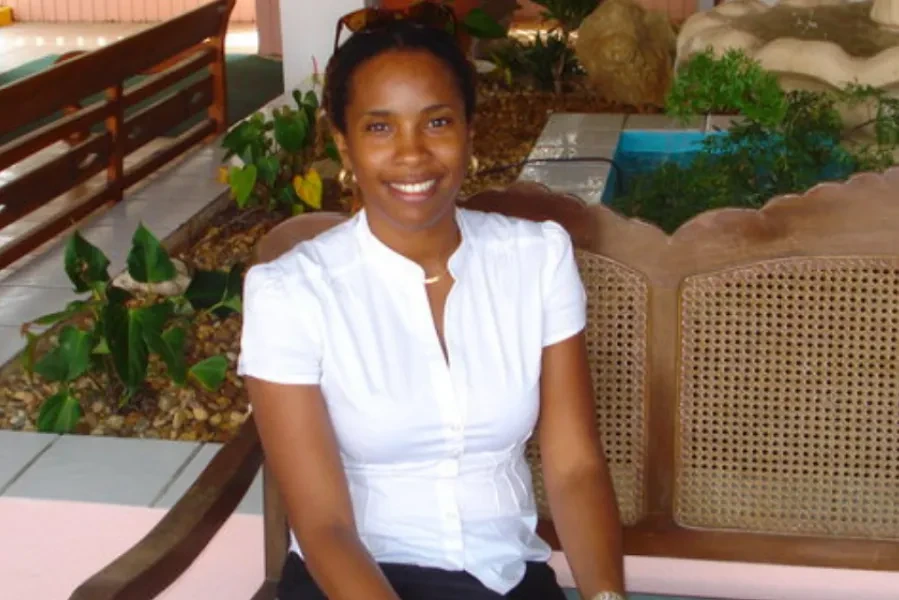When she’s not busy helping new University of Arizona Global Campus students flourish through her role as lead faculty member in the Center for Enhancement of First-Year Experience, Dr. Sherrie Timoll-Mueller is likely to be found either reading or helping with home improvement projects with her husband.
“We bought a fixer-upper,” she laughs. “Our entire life revolves around fixing up our house.”
The couple, who currently live in Iowa and have three grown children together, met more than a decade ago while Dr. Timoll-Mueller was living and teaching in St. Croix, in the Virgin Islands.
This Jamaica-born instructor first discovered she had a passion for teaching through a slightly unorthodox path.
“In Jamaica, when you get to the eleventh grade, you take an examination to see what type of career you’re qualified for, and then you can continue further along that path in grades 12 and 13, which are optional. I didn’t want to continue school at the time because I was bored,” she recalls.
So, Dr. Timoll-Mueller decided to work in the hospitality field at a hotel. “I lasted about two years before I realized it wasn’t for me.” And she explains, “I recognized that I liked school, and I liked learning. So, I went back.”
When Dr. Timoll-Mueller finished her studies, she began teaching and loved it, so she decided to continue on to earn her Bachelor’s in Education, followed by her Master of Education in Curriculum and Instruction in Technology. But she had no intention of stopping there. In October 2019, she finished her thesis on faculty and student perspectives on online interactions, capping off her educational journey with a PhD in Education with a Specialization in Curriculum, Instruction, and Assessment from Ashford University*.
“I’m the type of person who, when I start something, I feel like I have to finish it. I have to go to the top,” says Dr. Timoll-Mueller.

Dr. Timoll-Mueller’s Entry into the World of Education
For many years, Dr. Timoll-Mueller had worked in the K–12 setting, including during her time spent in the Virgin Islands. Being in the field of education, she had always assumed job security was one of the last things she would ever have to worry about.
However, a few years ago, she witnessed a round of layoffs at work that resulted in nearly the entire department being let go. Dr. Timoll-Mueller was spared, but the experience made her reevaluate her goals and approach to finances.
“Coming out of teaching, especially high school, your job is so secure. Teachers rarely get fired or let go, so I wasn’t even thinking about it. But I was worried because I realized it could’ve been me and we had a mortgage and car loans, all of that. It made me realize we might have been in trouble and had to do something different financially. Because of that experience, I decided to take control. I educated myself about money. We sold our house and bought a less expensive one. I drive the car I drive because of that. I pay tuition out of pocket for my son. I feel like when I have control of my personal finances, other things around me won’t affect me too much.”
Looking Toward the Future
Although Dr. Timoll-Mueller and her husband now spend much of their free time fixing up their home, it’s a pastime that suits both of their various talents.
"My husband is really good with his hands, so he does all the work,” says Timoll-Mueller. “I’m more of the supervisor. I look up the ideas and put in the background work. Then I tell him what we want, and he does it. The only challenge is living in a construction zone!”
However, the couple doesn’t intend to be in the DIY home improvement business forever. “We keep bouncing around this idea of selling the house in a few years, buying a camper, and traveling the country,” says Timoll-Mueller. “I get really excited about traveling. We both do. I like the idea of getting your bearings in a new place. It’s exciting.”
As hiking enthusiasts with a shared obsession for national parks, they’re hoping to visit as many of them as they can. Yosemite National Park is at the top of their must-see list. “We want to get to all the national parks, places with no cell phones, no technology. It just sounds so serene and beautiful.”
We talked more in-depth with Dr. Timoll-Mueller to get her perspective on education and learn more about her approach to helping ensure every new student at Global Campus gets off to a great start.

Getting to Know Dr. Timoll-Mueller
From teaching to traveling, Dr. Timoll-Mueller represents the spirit of UAGC. Here, she offers insight into her philosophy on education, Ashford’s transition to UAGC, student’s success, and more. Read on, and get to know more about one of your favorite instructors.
UAGC: What’s your approach to teaching?
Dr. Timoll-Mueller: I think education is a tool for upward mobility. It’s a powerful tool. So, when I see new students coming in, I bend over backwards to help them succeed. I know it’s not easy to manage life and attend classes, so if they’re doing it, it means they’re invested in the process. And I know how much higher education is going to impact their lives later on. It’s going to impact how they think, their career path, their earning power. Every way I look at it, it’s transformative. So as long as they’re willing to attend classes, I will do everything possible to ensure that they get from my class to the next one.
UAGC: You’ve worked with the university for several years. Can you share your thoughts on Ashford University’s recent transition to the University of Arizona Global Campus?
Dr. Timoll-Mueller: What excites me most about the transition to UAGC are all the possibilities. With a new adventure comes new opportunities for growth and change. Because I constantly seek ways to challenge myself, I look at this transition as more room to do that. I’m excited to see what changes come about and how we will shape ourselves in the future as this new institution. We are embarking on this awesome new adventure, so there is no time to feel bored or stuck in a rut. In this moment, the possibilities for what we could become feel limitless.
UAGC: As lead faculty at the Center for Enhancement of First-Year Experience, your class is one of the very first courses students take. Can you speak to the first-year and incoming students in detail and explain how the Center is designed to help them succeed?
Dr. Timoll-Mueller: We’re focused on developing competencies. We help build strong educational foundations. We have different courses, but the overall focus is helping students gain the skills they need to be successful in their careers and in their programs at school. Students come in excited to get into their specific programs but need to take general education classes first. What we try to do is link these classes to professional uses so they can see how they can apply all the skills they’re learning in school, both in their current careers and in future ones. In our classes, they’ll focus on a literacy theme, learn critical thinking, leadership skills, and how to collaborate as a team. We also look at things like career management, cultural competency, all the thinking that will help them get to where they need to be to succeed.
UAGC: What do you think is one of the key components to having a mindset of success for students on the path to earning their degree?
Dr. Timoll-Mueller: I tell students to focus on one step at a time. I find students get overwhelmed when they think, “Oh, it’s such a long journey,” or that they have so much to do to get to the end. Just focus on the assignment due, putting one foot in front of the other. Before you know it, you’ll look up and graduation is here. Simply focus on each task, each moment and truly live in the moment without worrying about what’s down the road. It’s a marathon, not a sprint.
UAGC: What’s your advice for any students who find themselves having trouble with their classes or coursework?
Dr. Timoll-Mueller: My advice is to define the trouble. Is it time management trouble? What is it? If you don’t know what’s causing the issue, you can’t fix it. The key is to reflect and focus in on the problem and then address it specifically. I’ll get emails from students that will simply say, “I’m so lost.” My first question is always, “Where are you lost?” We identify the problem and then together we work on fixing it. If it’s time management, you have to fix that first and then you’ll be better able to focus on your class. If a student is having trouble with the writing portion of their assignments, we have the Writing Center. There is always help and there are so many resources out there. It’s important to live in the solution, not the problem.
--
*Ashford University is now the University of Arizona Global Campus.
Certain degree programs may not be available in all states.
